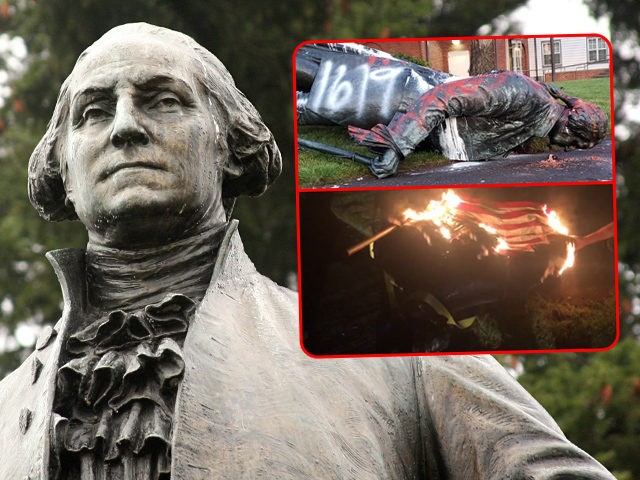The Atlantic hit piece on President Donald Trump last week used four anonymous sources to allege that he had disparaged dead World War I soldiers two years ago. Fox News reporter Jennifer Griffin then claimed to have “confirmed” parts of the story — though not its main allegation — based on two anonymous sources.
The entire story failed to meet basic journalistic standards. But it is a sign of things to come — particularly if Democrats win in November, which is the Atlantic‘s goal.
Two, or even four, anonymous sources can be used to claim absolutely anything. The Atlantic described them as “four people with firsthand knowledge of the discussion that day.”
Notably, we are not told that they personally heard Trump say what the Atlantic alleges he said — they just have “knowledge of the discussion.” Someone who has “knowledge” of a discussion is a second-hand source, or worse. The point is there is no way to know if the sources are credible, or if the story is just made up.
It turns out that we do actually have some very good historical sources that dispute the Atlantic story. These include the 11 eyewitnesses who have gone on the record to deny the president said what the Atlantic alleged, but they also include other sources.
The Atlantic‘s claim, for example, that the president avoided a trip to a military cemetery because he did not want his hair to get wet is refuted by government documents and even by the unfriendly memoir of former aide John Bolton.
And yet much of the media ran with the story anyway — unchastened by the recent history of other “confirmed” stories, like the Russia “dossier.”
In 2018, NBC falsely reported that President Donald Trump had become the first president since 2002 not to visit the troops at Christmas. It then turned out Trump was in Iraq with the troops.
In that spirit, NBC’s White House correspondent, Peter Alexander, asked the president on Friday — in the Oval Office — to “apologize” to soldiers and veterans.
Alexander reported on MSNBC shortly thereafter that whether the story is true or not, it “resonates.” Former Vice President Joe Biden said much the same in his press conference that day, citing Trump’s joke at John McCain’s expense in 2015. (Few bothered to remember that McCain attacked Trump first — and Trump supporters — saying that Trump had “fired up the crazies” in the Republican Party.) There was no actual proof — just partisan prejudice, clearly based on political bias.
A report in the Wall Street Journal showed how it is simply impossible to report the Atlantic story without repeating the lie, thereby ingraining it further into the public imagination. “Trump Denies Report He Disparaged Military,” the headline read. The lede paragraph, reporting Trump’s denial, had to repeat the allegations.
The media “fact-checkers,” who meticulously document every inaccurate Trump statement (or politically incorrect opinion), were somehow absent when a real lie arrived.
In 1942, George Orwell wrote:
Early in life I have noticed that no event is ever correctly reported in a newspaper, but in Spain, for the first time, I saw newspaper reports which did not bear any relation to the facts, not even the relationship which is implied in an ordinary lie. I saw great battles reported where there had been no fighting, and complete silence where hundreds of men had been killed. I saw troops who had fought bravely denounced as cowards and traitors, and others who had never seen a shot fired hailed as the heroes of imaginary victories; and I saw newspapers in London retailing these lies and eager intellectuals building emotional superstructures over events that had never happened. I saw, in fact, history being written not in terms of what happened but of what ought to have happened according to various ‘party lines’.
Orwell would later develop this insight in his novel 1984, where the ruling party rewrote history as needed for its interests. “Who controls the past controls the future,” he wrote.
Orwell’s warning is particularly relevant as America confronts a wave of fake news, and an assault on history — not just statues and symbols, but on the teaching of history itself.
The New York Times, supposedly the “paper of record,” won the Pulitzer Prize for journalism this year for the lead essay in the “1619 Project,” even though it had to be corrected after historians said its central contention — that slavery motivated the American Revolution — was wrong.
The 1619 Project is being used to develop school curricula, and has given its name to the ongoing “racial justice” riots. The people who will teach the history of this period have already classified these conflagrations as “mostly peaceful” protests.
“In the last analysis our only claim to victory is that if we win the war we shall tell less lies about it than our adversaries,” Orwell wrote in 1944.
We may expect an Orwellian future if the Atlantic‘s tactics deliver victory to the left in November.
Joel B. Pollak is Senior Editor-at-Large at Breitbart News and the host of Breitbart News Sunday on Sirius XM Patriot on Sunday evenings from 7 p.m. to 10 p.m. ET (4 p.m. to 7 p.m. PT). His new book, RED NOVEMBER, tells the story of the 2020 Democratic presidential primary from a conservative perspective. He is a winner of the 2018 Robert Novak Journalism Alumni Fellowship. Follow him on Twitter at @joelpollak.

COMMENTS
Please let us know if you're having issues with commenting.